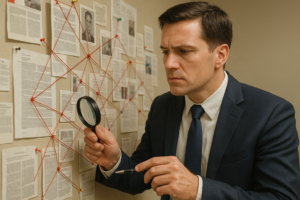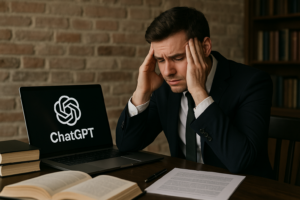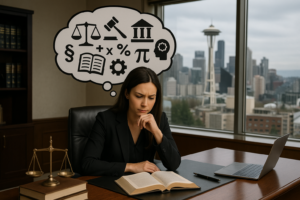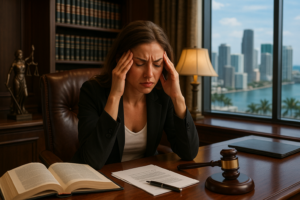Alcohol abuse among attorneys in the United States is significantly higher than in other professional populations, yet systemic barriers and deep-rooted psychological dynamics keep many lawyers from seeking treatment. Beyond professional stigma, this article explores the psychological sophistication attorneys use to preserve their relationship with alcohol, often through mechanisms of rationalization and intellectualization. Drawing on the “relationship theory” of alcohol abuse, the piece examines the unique way attorneys come to rely on alcohol not merely as a substance, but as a primary relationship that allows for control over emotional states without reciprocal vulnerability. The article contends that this dynamic both arises from and perpetuates a profound deficit in emotional regulation and connection—one that treatment cannot effectively address until the attorney is willing to relinquish the illusion of control offered by alcohol.
Introduction
The American legal profession faces a largely unspoken crisis. Despite—or perhaps because of—its demands for intellectual rigor, emotional detachment, and perfectionism, it fosters a disturbing prevalence of alcohol abuse. A groundbreaking study published in the Journal of Addiction Medicine in 2016 surveyed over 12,000 licensed, employed attorneys and found that 21% scored in the hazardous, harmful, or potentially alcohol-dependent range on the Alcohol Use Disorders Identification Test (AUDIT), compared with 6.8% of the general population (Krill, Johnson, & Albert, 2016). Younger attorneys, in particular, showed alarmingly high rates of problematic drinking.
These findings are not isolated. Numerous state bar reports, disciplinary actions, and anecdotal accounts paint a consistent picture: a profession where chronic stress, adversarial work environments, and cultural normalization of alcohol consumption converge into a systemic health issue. And yet, despite the high prevalence, very few attorneys seek treatment until consequences become catastrophic.
This article interrogates the deeper reasons why. Moving beyond the well-documented structural and reputational barriers, it explores the inner psychological architecture of the attorney psyche—particularly the role of alcohol as a surrogate relationship that offers attorneys emotional modulation without vulnerability. Drawing on emerging insights from psychodynamic theory and clinical observations, the article advances the “relationship theory” of alcohol abuse as a lens uniquely suited to understanding why lawyers often cling so tightly to alcohol and so resist treatment, even when fully aware of the damage being done.
Alcohol Abuse in the Legal Profession: Scope and Research
The 2016 study by Krill et al. remains the most comprehensive empirical investigation into attorney alcohol use. Among its key findings:
(1) 32% of lawyers under age 30 reported problematic drinking.
(2) High-stress practice areas—especially litigation and corporate law—correlated with greater rates of abuse.
(3) Many attorneys admitted to using alcohol to cope with anxiety, depression, and isolation, yet very few had sought treatment.
Other studies echo these findings. A 2020 report from the California State Bar found that disciplinary cases involving attorneys were overwhelmingly linked to substance use, especially alcohol. Interviews with impaired attorneys consistently reveal themes of overwork, emotional exhaustion, and alienation—often paired with high-functioning denial and rationalization.
What distinguishes attorneys from other high-stress professionals, however, is not merely the pressure, but the unique culture of emotional disconnection, intellectualization, and identity fusion with competence and control. These characteristics both precipitate alcohol misuse and render recovery uniquely challenging.
Barriers to Treatment: Stigma, Rationalization, and Intellectualization
Stigma and the Fear of Incompetence
For attorneys, image is not a superficial concern—it is currency. A public admission of alcohol abuse is often equated with a failure of self-mastery, judgment, or trustworthiness. Because the legal profession remains predicated on the appearance of control and capability, many attorneys fear that seeking help will brand them as emotionally unstable or incapable of handling the responsibilities of practice. This stigma is particularly pronounced in competitive firm environments where vulnerability is tacitly equated with liability.
The Rationalization Reflex
Even more insidious than external stigma is the internal machinery of denial and rationalization. Lawyers, trained to construct compelling arguments from incomplete or unfavorable facts, turn this skill inward. Alcohol use becomes “celebration,” “networking,” “stress management,” or “harmless unwinding.” Because the attorney can cite outward success—clients served, cases won, promotions earned—the case for concern is dismissed.
Indeed, the lawyer’s capacity for narrative construction—essential in legal work—becomes a powerful psychological defense. Problematic behavior is reframed, minimized, or justified with intellectual sophistication. In this sense, lawyers are uniquely equipped to remain in denial, even in the face of evidence that others would find disconfirming.
The Relationship Theory of Alcohol Abuse
To understand the deeper dynamics of alcohol abuse in the legal profession, it is helpful to conceptualize alcohol not as a mere substance, but as a relationship—one that provides structure, control, and emotional relief.
Alcohol as an Ideal Relationship
In this theory, alcohol becomes the attorney’s most consistent and dependable relationship—one that:
(1) Regulates affect without requiring expression.
(2) Provides control over internal states without reciprocal demands.
(3) Reinforces identity as independent, competent, and self-reliant.
Unlike human relationships, alcohol asks nothing of the lawyer. It does not need, disappoint, or criticize. It is available on demand and reliably modulates anxiety, rage, grief, or emptiness. This relational dynamic is particularly appealing to attorneys who, by virtue of training and temperament, are uncomfortable with vulnerability, uncertain affect, and emotional needs.
Emotional Illiteracy and the Lawyer’s Inner World
The intense reliance on logic and objectivity in law school and practice often comes at the expense of emotional development and regulation. Many attorneys—especially those who entered the profession seeking control over chaotic early environments—arrive with underdeveloped tools for understanding or expressing emotion. They excel in argument, but falter in introspection. Emotional states feel foreign, disruptive, or shameful.
In this context, alcohol becomes a proxy for emotional regulation. It offers relief without requiring insight. Over time, it can eclipse human intimacy entirely, becoming the lawyer’s primary strategy for managing an inner life they do not know how to inhabit.
Severing the Bond: The Prerequisite for Healing
Recovery from alcohol abuse is not merely a matter of willpower or abstention—it is, in this framework, a grieving process. The attorney must mourn the loss of their most trusted, stabilizing companion. This is no small task. Alcohol has often served as:
(1) A barrier against painful memories or unspoken traumas.
(2) A shield from the vulnerability of emotional exposure.
(3) A scaffolding for identity when other parts of life feel unstable.
Until the attorney becomes willing to acknowledge the centrality of this relationship—and the ways it has insulated them from emotional growth—they cannot truly engage in the therapeutic work required for sustainable recovery. This work involves learning to tolerate emotional discomfort, to cultivate genuine intimacy, and to dismantle the illusion of control that alcohol so effectively sustains.
Conclusion
Alcohol abuse in the legal profession is not a peripheral issue—it is a cultural and psychological crisis. Attorneys abuse alcohol not simply because they are stressed, but because they are often emotionally underdeveloped, relationally isolated, and professionally incentivized to appear invulnerable. The profession rewards precisely those traits—control, detachment, argumentation—that can render its members uniquely resistant to treatment.
To address this crisis, the legal community must move beyond stigma reduction and wellness platitudes. It must acknowledge the psychological reality: for many lawyers, alcohol is not a problem to be solved, but a relationship to be surrendered. Only when this relationship is relinquished can the attorney begin the arduous but liberating work of emotional development, connection, and healing.
References
Krill, P. R., Johnson, R., & Albert, L. (2016). The Prevalence of Substance Use and Other Mental Health Concerns Among American Attorneys. Journal of Addiction Medicine, 10(1), 46–52.
American Bar Association Commission on Lawyer Assistance Programs. (2021). Well-Being Toolkit for Lawyers and Legal Employers.
National Institute on Alcohol Abuse and Alcoholism. (2022). Alcohol Facts and Statistics.









